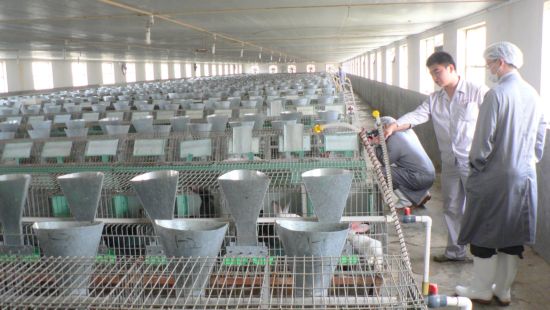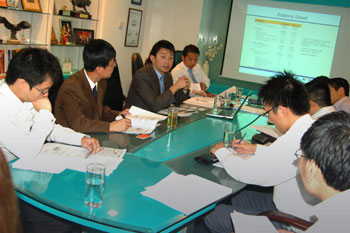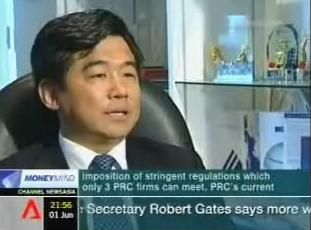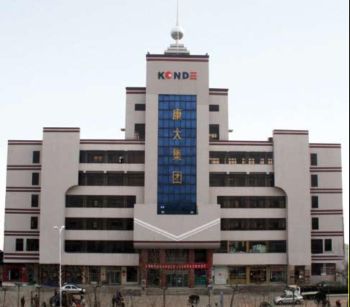
Stanley Leung, CFO, speaking with fund managers in HK last week. Photo by Don Tam
CHINA KANGDA Food, the country’s largest exporter of rabbit meat, expects future growth to be driven by continued strong demand and capacity increases for the product, which is still a relative novelty at home.
Rabbit meat sales rose 12% last year to 34.8 mln yuan, while processed foods slipped 6% to 66.9 mln. The Shandong province-based firm, listed in both Singapore and Hong Kong, is one of a handful of domestic firms with authorization to supply rabbit meat to the EU, the product’s biggest consumer.
The firm is able to charge a premium on its rabbit meat exports due to stringent quality accreditations required to enter the EU marketplace.
“It’s a high margin product (due to this). And to help ensure compliance we recently bought four mln yuan worth of testing equipment from Germany,” said Mr. Stanley Leung, Kangda’s CFO.
Thanks to a new processing plant in Jilin province, which came online in February this year, Kangda will double its total annual production capacity of rabbit meat to 12,000 tons by end-2009.
“Around 70% of our rabbit meat is exported, primarily to the EU and Russia, while most of our chicken is sold domestically, with 90% bound to restaurants including KFC and McDonald’s. Rabbit meat is still a relative rarity here in China, but we are aggressively working to change that,” Mr. Leung said.
Disappointing Jan-March Results
However, shortly after NextInsight spoke with Mr. Leung, the company released somewhat disappointing earnings for the January-March period, which revealed the increasingly anemic demand in its major export markets, as well as growing competition from low-priced pork in China.
Kangda’s Jan-March revenue fell 22.5% yoy to 164.4 mln yuan, which resulted in a net profit attributable to shareholders fall of 62.3% to 11.37 mln. Kangda said the unaudited results are in line with the profit warning announcement released by the firm on April 24.
The sluggish economy deviling its main customer for rabbit meat – the EU – was the chief culprit for the weaker-than-expected first three months.
Jan-March Rabbit Sales
As a result of global economic downturn, export sales of rabbit meat products decreased following decrease in demand from the EU for rabbit meat.
Revenue from the sale of rabbit meat decreased by 43.6% to 19.9 mln yuan in the first three months compared to a year earlier. Exports accounted for around 70% of total rabbit meat sales, the statement added, which explains why the company’s overall performance is so closely tied to sales of the meat to the EU.
Jan-March Chicken Sales
Chicken meat contributed 30.3% to total revenue for Kangda’s first three months. Revenue dropped by 47.5% yoy to 49.8 mln yuan, due mainly to keen competition in the PRC market. The significant increase in pork prices in the PRC resulted in increase in demand for chicken meat product as a substitute in the past few years.
However, the average price of pork has decreased continuously from the second half of 2008 and this has resulted in a significant decrease in demand for chicken meat in the Jan-March period.
The results still do not take into consideration the recent North American swine flu situation. The company will no doubt soldier on, despite the difficult first three months.
And it is not content to sit idly by, but is planning to adjust and expand capacity to fit market needs. The acquisition of two related companies, KD Animal Rearing Co and KD Rabbit Co, as well as assets from Qingdao Kangda Foreign Trade Group Co Ltd will also provide the Group with in-house capabilities for the breeding and rearing of rabbits and chickens.

One of Kangda's rabbit farms. File photo by Leong Chan Teik
This is in line with the Group’s strategy to be a diversified and integrated food processing group with the three business segments: chicken, rabbit and processed foods. The company’s product umbrella is well diversified with four main categories: rabbit meat, chicken, processed foods (seafood, vegetables, meatballs, soup ingredients and seasonings) and other products including pet food.
“Japanese fast food restaurants are a big buyer of our processed foods like meatballs and soup mixes. We also recently spent 10 mln yuan to boost our vegetable production capacity for the ‘meatballs’,” he said.
Mr. Leung added that its major domestic competitors were better known firms such as Dachan and China Agri, but that the company was strategically situated among exporters, being China’s largest exporter of rabbit meat to the EU, Russia and Japan, with the additional honor of being one of only two domestic firms authorized to export the product to Russia.
Under the Group’s vertically-integrated business model (from chicken and rabbit breeding, rearing, slaughtering and processing), the goal is to establish a complete and competitive food supply chain with a dominant position in China.
The company believes in protecting share value, deciding to opt instead in October for a 3-year syndicated loan agreement for 105 mln hkd with CITIC Ka Wah Bank and two participating banks as lead arranger and original lenders, respectively.
The loan is guaranteed and secured against the shares of the company’s subsidiaries: Perfect Food Group Ltd and Spiritzone Group Ltd, with the funds to be used to refinance existing debt facilities, project investment and working capital requirements.
The company’s top line grew an impressive 29.5% in FY2008 to 943.4 mln yuan. “This slight deterioration in our net profit over the period was due to the one-off expense associated with our Hong Kong listing last year,” Mr. Leung added. If its sales breakdown by region is any indication, the company is starting to gain a foothold in its home market, whether it be for chicken, rabbit or processed foods.
In FY2007, domestic sales made up 56.6% of total revenue, which quickly hopped to 60.2% the following year.


 NextInsight
a hub for serious investors
NextInsight
a hub for serious investors






